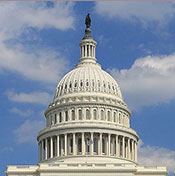Invisible and Silent No More: The Necessity of Centering Anti-Racism as We Address Inclusion and Access for Disabled Community Members
By Gretchen Sneegas, PhD, Texas A&M University and Arrianna Planey, PhD, University of North Carolina, Chapel Hill
Editor’s Note: This month, we present a Perspective from AAG members Dr. Gretchen Sneegas and Dr. Arrianna Planey. Their commentary on the intersectional nature of marginalization and discrimination in terms of disability and anti-Blackness is a response to the August 2020 President’s Column by AAG Past President Amy Lobben. In the first version of the column shared on social media, Dr. Lobben critiqued the lack of universal physical access at AAG headquarters by saying, “People who use manual or motorized wheelchairs cannot enter the front door – something that is reminiscent of the days of segregation.” In response to member concerns, AAG made the decision to remove the reference to segregation.
We thank Drs. Sneegas and Planey for their perspective on the intersectional dynamics of ableism and anti-Black racism. Our thanks also to Dr. Lobben for being in dialogue with the authors and with us, as well as to our Strategic Communications Editorial Board for their independent review and input as we finalized this column.
Picture this: A disabled Black woman uses her cane to navigate dark, non-descript hallways as she attends the American Association of Geographers meeting. She nervously fiddles with her badge to make sure that it is visible so that no one polices her or questions her right to be present in the space. Unfortunately, her vigilance is for naught: an older white gentleman corners her and questions whether she’s really disabled. This is the third such incident at this conference – one experienced personally by one of this op-ed’s co-authors.
This woman is not disabled first. She is Black and disabled, experiencing racism and ableism simultaneously and cumulatively, not sequentially. Understanding this reality is the essential contribution of intersectionality, or how overlapping axes of privilege and oppression compound experiences of advantage or discrimination (Combahee River Collective, 1986; Crenshaw 1989, 1991).
In her July 31, 2020 newsletter column, “The Invisible and the Silent,” AAG President Amy Lobben raised important questions on the culture of ableism in the AAG and academia, making numerous recommendations for improving inclusion for disabled AAG members and their families: applying universal design principles to the AAG’s website, improving conference accessibility, and promoting an Accessibility Task Force. However, these efforts must place racism – particularly anti-Black racism and white supremacy – at their forefront (Lewis, 2020).
We argue the AAG must explicitly address the intersections of racism and ableism, not to mention oppressions based on gender, sexuality, and socio-economic status. Any effort to address ableism is necessarily incomplete without simultaneously addressing white supremacy. We call on AAG to center its work against ableism around disabled geographers of color, especially those racialized as Black, because of how ableism is experienced by, and employed as a weapon against Black people particularly.
Confronting Ableism Means Confronting Racism
Nowhere is the racism-ableism intersection more starkly rendered than the violence perpetrated against Black communities at the hands of police and legal systems. A 2016 analysis of the Washington Post database on fatal police shootings found Black Americans to be 2.5 times more likely to be killed by police than white Americans. Another study estimates that between one third to one half of all people killed by police are disabled (Perry and Carter-Long, 2016). Deafness, blindness, autism, mental illness, and physical or cognitive disabilities often register to police as ‘abnormal’ behavior or not following directions, resulting in far higher risk for violence, brutality, and death. Policing also produces disability, with survivors of violent police acts left with long-term physical and mental damage, creating an ongoing cycle of trauma. Disabled Black Americans are thus at some of the highest risk for police violence and discrimination in ways that are compounded by intersections between how they are racialized and their disability status, and not reducible to their Blackness or disability. The tragic and incomplete list of Black people with disabilities killed by police includes Marcus-David Peters , Sandra Bland, Freddie Gray, Tanisha Anderson, Deborah Danner, Ezell Ford, Keith Lamont Scott, Alfred Olango, and Walter Wallace, Jr.
Dr. Lobben writes that “People with disabilities become invisible….Through able-ism, they are silenced.” Her claim can be deepened by a broadened focus on other axes of privilege, oppression, and power. The disproportionate police violence against Black people with disabilities transects the literal and metaphorical invisibility of disabled people with the hypervisibility of Blackness as a perceived threat to white supremacist “law and order,” while simultaneously erasing Black disabled peoples’ individuality and vulnerability. Not coincidentally, many such incidents turn on the misperception of disability, wherein “invisible” disabilities affecting mental and physical health (e.g., deafness, mental illness) are ignored in the white mainstream disability conversation, even as they figure prominently in police violence against Black communities.
The intersections of (in)visibility, racialization, and ableism are highlighted by a particular section of Dr. Lobben’s column. On our first reading, we were struck by a parallel comparison she drew between the lack of American with Disabilities Act compliance at AAG’s headquarters and the shameful history of racial segregation in the United States: “People who use manual or motorized wheelchairs cannot enter the front door – something that is reminiscent of the days of segregation.” The sentence was subsequently edited out of the column.
Defining ‘segregation’ as merely a form of spatial separation is widely seen in mainstream disability conversations. However, the term ‘segregation’ cannot be uncoupled from its history of state-sponsored domestic terrorism in the U.S. The weight of these cultural meanings makes comparing the seemingly “universal” challenges of a majority-white mainstream disabled community to racialized segregation insensitive at best. Separate accommodations for people with disabilities cannot be compared with racial segregation, defined as the racialization of space and the spatialization of race by means of policy, policing, and other informal and state-sanctioned practices (Lipsitz, 2007). The harmful effects of racial and ethnic segregation reverberate throughout Black American communities to the present day, including the disproportionate public health, economic, and regulatory impacts of COVID-19 on Black people (Summers, 2020).
While the segregation comparison may seem innocuous, not addressing the harm it causes to Black AAG members perpetuates the foundations of anti-Black racism that have long gone unaddressed in academic spaces and institutions, including the AAG. Countless Black scholars have written about such micro-aggressions – on Twitter with the #BlackInTheIvory hashtag, in essays and op-eds (Hamilton 2020a, Roberts 2020), and via peer-reviewed scholarship (Eaves 2020b, Hamilton 2020b, 2020c) – which unambiguously inform Black academics on a daily basis that their safety and well-being are not respected, centered, or guaranteed.
How AAG Can Engage Fully in the Work to Address Ableism
Geography is an overwhelmingly white discipline – not only in terms of membership numbers, but also in its cultural norms and institutional structures, which function as gatekeeping tools to determine who is included (Kobayashi and Peake, 2000; Gilmore, 2002; Peake and Kobayashi, 2002; Pulido, 2002; Woods, 2002; Kobayashi, 2014; Eaves 2020a; Faria and Mollett 2020; Hamilton 2020c; Oswin 2020; Roy 2020). Geography lags behind other disciplines in African American and Hispanic representation for student enrollment and degree conferral, and comprises less than 5% of all geography faculty compared to 10% of all higher education faculty (Faria et al., 2019). It is vital that the AAG act on the arguments which these and other BIPOC (Black and Indigenous People of Color) scholars have been making for decades if justice and inclusivity are truly its goals.
AAG must exert stronger leadership to have uncomfortable yet essential discussions about racism and colorism across all of its activities. We are glad to see President Lobben leveraging her access to AAG’s large platform to highlight the long-overlooked issue of suppression faced by disabled scholars. AAG’s efforts to do so must also explicitly center, not just include, disabled geographers of color who face unique and compounded challenges at the racism-ableism juncture.
One of the most critical actions AAG can take is for the new Accessibility Task Force to explicitly highlight the intersections of race/ethnicity and ableism, to address and avoid reproducing white supremacist power dynamics in the AAG. Some recommendations include (but are not limited to):
- Actively center disabled scholars of color across all stages of the Task Force’s activities and act on their suggestions. It is not enough to include BIPOC scholars with disabilities at the table – their needs must be prioritized.
- Create multiple avenues for formative feedback from the AAG membership, making sure to prioritize comments from disabled BIPOC AAG members.
- Develop relationships with AAG specialty/affinity groups that work with AAG members with increased risk of discrimination on the basis of race, ethnicity, gender, sexuality, and disability status, including the Disability specialty group, Mental Health affinity group, and Senior Geographers association.
- Work with the AAG Harassment-Free Task Force and COVID-19 Rapid Response Task Force to address intersections of race/ethnicity, ableism, discrimination, and health.
- Highlight the racism-ableism relationship within this year’s Geographies of Access theme for the Annual Meeting, as well as future AAG conference themes, special AAG conference sessions, and/or proposed special issues in AAG journals.
We also encourage all AAG members to center the needs of BIPOC geographers with disabilities as they actively engage the Black Geographies Specialty Group’s call to “go beyond their statements [of solidarity] and work to transform the discipline by addressing its legacies of racism, imperialism, colonialism, homophobia, and sexism”.
Incorporating the intersections between ableism and racism in the AAG’s continued work on disability-based discrimination will benefit all AAG members. This is the only way to avoid deepening the unequal vulnerabilities faced by disabled geographers of color, while working towards restorative justice that centers those who have been most harmed. We ask the AAG leadership and all geographers to bring their energy and dedication to the concerns we articulate here, implementing them at the AAG; your institutions and departments; and in your teaching, research, and mentorship.
DOI: 10.14433/2017.0096
Perspectives is a column intended to give AAG members an opportunity to share ideas relevant to the practice of geography. If you have an idea for a Perspective, see our guidelines for more information.
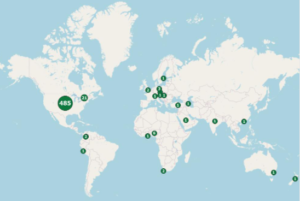
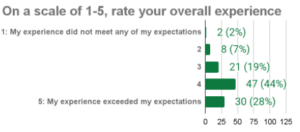

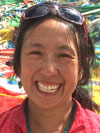
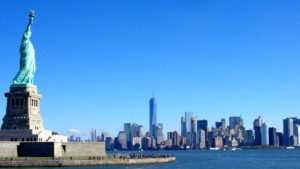
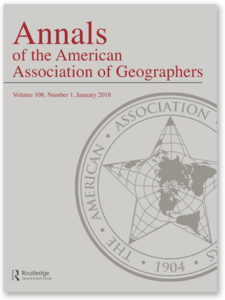
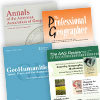 In addition to the most recently published journal, read the latest issue of the other AAG journals online:
In addition to the most recently published journal, read the latest issue of the other AAG journals online: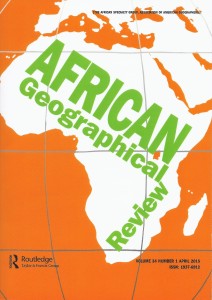 The latest issue of the journal of the Africa Specialty Group of the AAG, the African Geographical Review, has recently been published. Volume 40, Issue 2 is available online for subscribers and members of the Africa Specialty Group. The issue includes six new articles covering research in all fields of geography, including human, nature – society, physical and the techniques, to promote better representation of African scholarship, and to facilitate lively academic conversations regarding the African continent.
The latest issue of the journal of the Africa Specialty Group of the AAG, the African Geographical Review, has recently been published. Volume 40, Issue 2 is available online for subscribers and members of the Africa Specialty Group. The issue includes six new articles covering research in all fields of geography, including human, nature – society, physical and the techniques, to promote better representation of African scholarship, and to facilitate lively academic conversations regarding the African continent.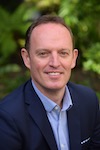

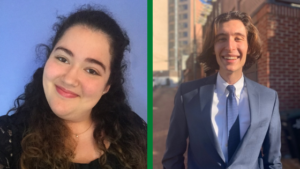 The AAG is excited to welcome two new interns coming aboard our staff for the Summer of 2021! Joining us this summer are Eliana Peretz, a senior at Mount Holyoke College pursuing a B.A. in Geography and Gender Studies, and Jacob Tafrate, a senior at the George Washington University pursuing degrees in Geography and International affairs, with a minor in Geographic Information Systems.
The AAG is excited to welcome two new interns coming aboard our staff for the Summer of 2021! Joining us this summer are Eliana Peretz, a senior at Mount Holyoke College pursuing a B.A. in Geography and Gender Studies, and Jacob Tafrate, a senior at the George Washington University pursuing degrees in Geography and International affairs, with a minor in Geographic Information Systems.